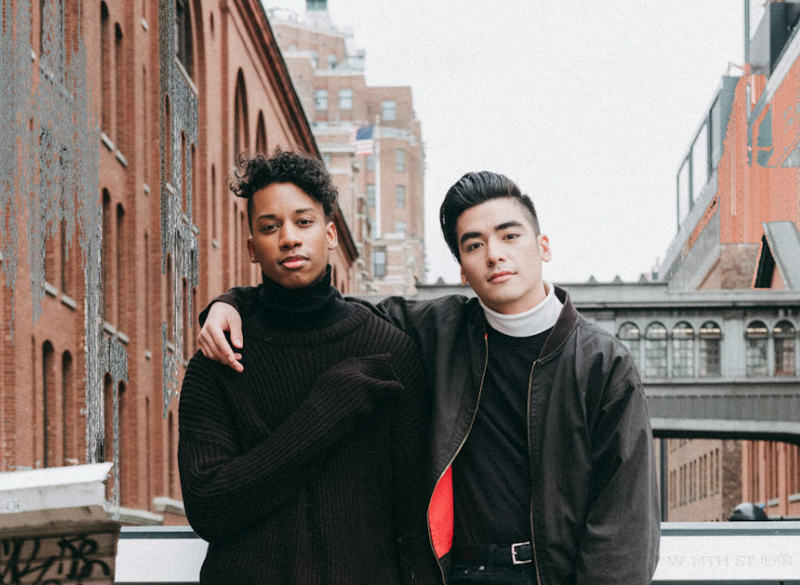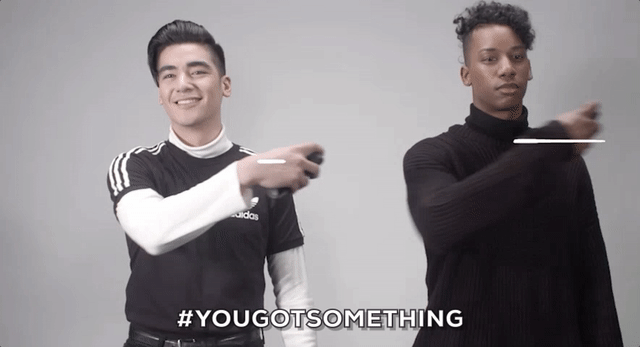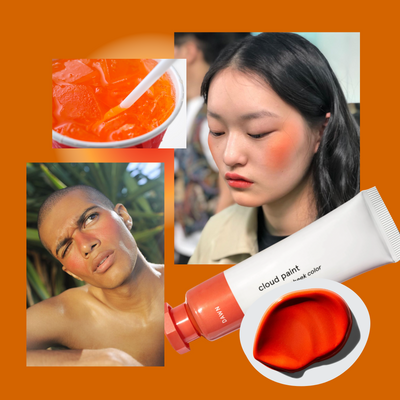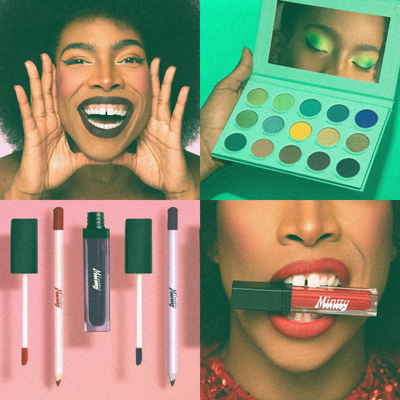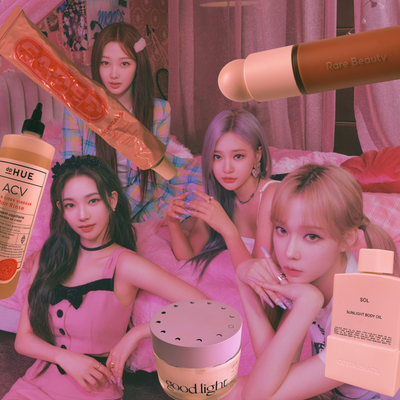In partnership
Jared basks in attention and shines in it, all 5’5″ of him.
Chris, who towers over Jared at six feet, is more than happy to observe quietly in the background where he’s most comfortable. While Jared is gay, Chris is straight.
On the exterior, they’re an odd pair: Two 19-year olds who are complete opposites in every sense. But when it comes down to the core of their friendship, they’ll tell you their bond is unshakeable. To them, nothing else – not your sexuality or your background – matters. Because when you’re friends you have each other’s backs, through thick and thin.
We wanted to see what happens when guys are able to compliment their friends, tell them how much they mean to them, and show their real and at times vulnerable sides.
“He’s my brother. I love that guy,” Chris says. “He’s always been there for me and challenges me to see things differently. He’s allowed me to become more confident in myself.” We’re hanging out at a photoshoot for Very Good Light and AXE for the brand’s newest fragrance, YOU.
The shoot was for this very story, which delves into male friendships and why guys have traditionally strayed from sharing their emotions. We wanted to see what happens when guys are able to compliment their friends, tell them how much they mean to them, and show their real, and at times vulnerable, sides.
Chris and Jared are joined by four other pairs who sat in front of our camera. We asked them to talk about their relationships. At first, each of the pairs sat awkwardly, fidgeting about. There were bursts of sudden laughter here and there to fill the silence. But as we kept the conversation going, it was surprising to see how each guy was open to comfortably verbalizing how much their friendships means to them. More so, it was powerful to see how young men can be more secure in themselves when they open up, without the confines of being stigmatized or judged for being real with their feelings.
It was certainly eye-opening. These 10 guys seemed to debunk studies from years past that found young men were going through a sort of generational identity crisis, one that stems from being emotionally stunted. Take for instance, the 2011 book, Deep Secrets: Boys’ Friendships and the Crisis of Connection by Niobe Way. Prof. Way, who teaches at New York University, studied young men and interviewed hundreds of them for two decades. She came up with this conclusion: teenage boys are lonelier and more insecure than she had thought.
In the finding, Prof. Way found young men have become disconnected with each other out for several reasons. Namely, it’s the fear of being stigmatized or even more extreme, negatively judged by showing intimacy or expressing feelings.
“This is not some academic read I’m doing,” she once said to the New York Times. “The boys are aware of the power of their relationships. They are overtly saying, ‘I want him, I need him, I miss him — no homo!’ And then they grow up and become depressed.” She found that most guys feel vulnerable especially around the ages of 15 and 16 and have difficulty verbalizing their needs.
“Guys aren’t going to typically want to sit around and talk about their feelings.”
The biggest reason for this is how generationally men have been taught to have specific relations with each other, says Professor Geoffrey Greif from the school of social work at the University of Maryland. He’s also the author of the book, Buddy System.
“Men tend to have shoulder-to-shoulder friendships and women have face-to-face,” he tells Very Good Light. “Meaning, men like to get together to do things women feel more comfortable face to face activities. This means that guys aren’t going to typically want to sit around and talk about their feelings.”
It goes back to the very beginnings of man and woman. Men were hunters and bonded through activities, such as searching for food, while women were gatherers and were more communal at home, bonding through storytelling. Today, Prof. Greif says traditional masculinity is “impossible to avoid,” given the fact that it’s been defined in a very limiting manner for centuries.
Pressures to be a certain version of masculine and to repress emotions affects young men into adulthood
“Being masculine is still painted in a stereotypical way,” he tells us. “You look at television, for instance, and see superheroes or policemen who look strong, gruff. You also see these notions of masculinity nurtured in your home settings where parents often hold guys to be a certain way. No wonder it’s been difficult for a young man to open up.”
Such pressures to be a certain version of masculine and to repress emotions affects young men into adulthood, says Prof. Way. That is, of course, if they make it that far. For many young men without support systems, suicide becomes what they believe to be their only way out. No wonder then, that among all teenage suicides, boys were found to be four times more likely than girls to end their lives. According to the Jason Foundation, more teens die from suicide each year than from HIV, cancer, heart disease, pneumonia, birth defects, among others.
Tragically, it seems to all makes sense. In these formative years, one where young people should be discovering who they are without repercussion, repression forces them to grow stoic, says Prof. Greif. This undoubtedly leads to many problems: depression, loneliness, a low sense of worth, among others. While girls and women friendships are allowed to be vulnerable (though, by no means is it easier to be a young teenage girl), this false societal notion that men are supposed to be emotionless, macho and hypermasculine, has had a devastating effect on generations upon generations of men.
But there is good news. Progress, at least according to a new generation of men, is being made. That is, Generation Z, the most gender fluid and sexually free generation. According to JUV Consulting, a teenage Gen Z-focused consulting firm, one that’s been featured in Bloomberg BusinessWeek, young men are no longer afraid to express their feelings.
“It won’t be long until we smash and shatter the archaic notions of masculinity.”
“Things haven’t fully changed, but things are changing,” says David Jones, a consultant from JUV. “We’re becoming more and more open to others, self-expression, and emotional awareness, far exceeding our predecessors.”
Though Jones acknowledges there’s still a ways to go with older generations opposing change and still others “enforcing the idea of masculinity,” he sees an optimistic future. “It won’t be long until we smash and shatter the archaic notions of masculinity,” he says to Very Good Light.
Which is in line with each of our five young duos we interviewed below. Each talks about how their mutual respect for one another runs deep and how they’ve learned to become unique versions of themselves thanks to their friends. They’re proving they’re not in some sort of “crises,” like the experts will tout. To them, opening up isn’t only empowering, it’s something that’s necessary to keep their friendships together. It’s what keeps them alive and well. Their friendships are a big part of how they see themselves, their identity and their own self-esteem.
It’s a complex subject, fore sure, but at the core of it, it’s pretty easy. These young men are simply uplifting each other, and by doing so, changing the world.
Dominick Alcantara and Dravid Dowansingh
[aesop_image img=”/content/images/wp-content/uploads/2017/04/DOM-DRAV.jpg” panorama=”off” imgwidth=”70%” credit=”(Photo by Paolo del Castillo/Very Good Light)” alt=”Dominick Alcantara and Dravid Dowansingh” align=”center” lightbox=”on” captionposition=”left” revealfx=”off” overlay_revealfx=”off”]
Dominick is Filipino American and Dravid’s parents are from Jamaica. The former is an aspiring model while the latter is studying to become a physician. The two grew up in completely different households and have differing backgrounds, but their friendship just works.
As the two will tell you, both met while hiding in the back rows in their calculus class, looking confusedly at the white board. After finding they sat next to each other class after class, they decided to become friends. When they finally hung out for the first time, they immediately opened up to each other.
“That day we met up at school and sat down and talked,” Dominick recalls. “We asked about each other’s lives and talked deeply about where we wanted to go. That’s when we set goals for ourselves and vowed to support each other to get there.”
It’s also when Dravid encouraged Dominick to pursue his real passion. At the time, Dominick was taking computer science classes. But after talking to Dravid, he realized he wanted to do something more creative. Dravid also found that, through pouring his heart out to Dominick, he wanted to pursue something different altogether: fashion.
“It means a lot to me,” Dravid says in retrospect. “Not a lot of my family supports me, but he does. My Jamaican family pushes me to get a good job and become a doctor. I settled because of their expectations. I’m blessed to have Dominick here.”
And both aren’t afraid to show it.
“I’m not afraid to show my love, no,” says Dominick. “Our generation is getting a lot better than the rest. We’re breaking down boundaries. Doing our own thing.”
“Apparently you’re not viewed as a man if you’re too sensitive or emotional,” echoes Dravid. “I don’t agree with that. If you consider yourself a man, you are a man. That’s that.”
Tong Guo and Gerald Gordon
[aesop_image img=”/content/images/wp-content/uploads/2017/04/TONG-GERALD.jpg” panorama=”off” imgwidth=”70%” credit=”(Photo by Paolo del Castillo/Very Good Light)” align=”center” lightbox=”on” captionposition=”left” revealfx=”off” overlay_revealfx=”off”]
Tong and Gerald grew up on opposite sides of the world. Tong, who was born in China, attended boarding schools all of his life, while Gerald was raised all of the U.S. being a “military brat.” But the two gravitated towards each other while attending NYU.
Before meeting Tong, Gerald had little to no clue about Chinese culture: the ways of filial piety, or Confucianism. Tong knew little about American culture.
“He didn’t even know who Frank Ocean was,” Gerald recalls, laughing. “That’s obviously changed,” Tong chimes in.
Though they’re from very different cultures, the duo’s friendship was cemented recently thanks to the recent political climate. Both put their differences aside and realized they were on the same mission, needing to stand up for each others’ rights as minorities.
“I realized Tong was not only a good friend but a best friend when I saw him taking a stand against bullies,” Gerald says. “It showed that he not only was loyal, but he had my back. He cares about my well-being as a black man in America. That means a lot.”
“I’m here for you,” Tong says. “I’ll always be your friend.” Which also means, he’ll always have his back.
Spencer McKinney and Jacob Price
[aesop_image img=”/content/images/wp-content/uploads/2017/04/SPENCER-JACOB.jpg” panorama=”off” imgwidth=”70%” credit=”(Photo by Paolo del Castillo/Very Good Light)” align=”center” lightbox=”on” captionposition=”left” revealfx=”off” overlay_revealfx=”off”]
“We’re not afraid to say we love each other,” says Spencer, of his friendship with Jacob.
The two met in Atlanta a few years ago and after, randomly became each others’ roommates. They initially thought they had nothing in common. Jacob is a skateboarder and Spencer is more into the arts. But it’s after opening up about their love for photography that the two cemented their friendship.
Years later, they stuck together when they decided to move to New York City to pursue their dreams. That’s when they found they needed each other the most. Without family or other friends around, they became like brothers.
“I’m not afraid to show my emotions around him,” says Jacob. “He’s been there at my best and worst and I’m comfortable to tell him what I’m going through.”
“We tell each other we love each other and it’s not this sexual love that people may automatically think,” says Spencer. “That’s such small thinking. I think it’s powerful when two guys, who might seem completely opposite just get each other and push each other to become greater. When I say ‘I love you’ to Jacob, that means I really do want the best for him and I know the feeling is mutual.”
Jared Martell and Chris Martinez
[aesop_image img=”/content/images/wp-content/uploads/2017/04/VGL4.jpg” panorama=”off” imgwidth=”70%” credit=”Photo by: Paolo Del Castillo/Very Good Light” alt=”Jared and Chris” align=”center” lightbox=”on” captionposition=”left” revealfx=”off” overlay_revealfx=”off”]
It was junior year when both Jared and Chris met on a bus. The two weren’t friends in school and hung around different crowds, but it was after sitting next to each other on the way to a retreat that they found they weren’t so different after all.
That summer, the two New York City natives bonded through their painful pasts, one that involved both of their fathers being absent in their lives. It’s a subject that’s still sore to Jared and Chris, but one that made them become closer to one another.
“We realized that even if we had different interests and friends, we could still be there for each other,” says Jared.
“We weren’t so different after all,” Chris says.
While on the exterior, the two are complete opposites: Jared’s a model and into fashion, Chris is a personal banker and into sports. But it’s that summer, and the bonding that happened that makes their friendship run deep.
“I wouldn’t be able to function without him,” Chris says of Jared.
A couple of months ago, Jared came out to Chris. His family didn’t know he was gay, his close friends didn’t, but it was Chris he confided in. But it was more than just coming out.
“I also told him that I had feelings for him that were more than just friends,” recalls Jared. It was a defining moment in their friendship and one that could have made things awkward or broken altogether.
But instead of reacting with negativity, Chris, who now was a girlfriend and happens to be straight, didn’t mind one bit. It didn’t change their friendship. “I didn’t think something like that would change what we already have. Our friendship was deeper than that.”
Jared coming out to Chris while also confessing his true feelings only made their friendship that much stronger. Today, Jared, who also is in a relationship, says he’s more secure because Chris is there for him. “Knowing that I have a close heterosexual male friend gives me peace that not everybody falls into ill societal constructs.”
Paolo Del Castillo and Joshua Castillon
[aesop_image img=”/content/images/wp-content/uploads/2017/04/JOSH-PAOLO.jpg” panorama=”off” imgwidth=”70%” credit=”Photo by: Paolo Del Castillo” align=”center” lightbox=”on” captionposition=”left” revealfx=”off” overlay_revealfx=”off”]
Paolo Del Castillo knew about Josh Castillon before he even met him.
Having been an amateur photographer from Gainsville, Florida, he followed Josh’s photography for years.
“I really liked his work and admired him from afar,” says Paolo. Even though Josh, who’s 18, is a couple of years younger, Paolo looked up to him.
It’s only after moving to New York on impulse, that he was able to meet Josh at a party. “The photography community is really small among our age group,” Paolo says. “So we had mutual friends.”
When he first ran into Josh, who grew up in Queens, he didn’t expect him to be so welcoming. After all, Josh was well known within the young photography community and found Instagram fame from his unique photos. But Paolo was quickly disarmed by how humble Josh was in real life.
Josh had asked about Paolo’s background and to see his Instagram page. The two immediately hit it off, even though they had near opposite styles of photography. While Paolo’s work, as you can see in this very story, is a mix between digital art and photos, Josh’s is all about manipulating light through a crystal prism to create his art.
The day after the party, the two started messaging each other through Instagram, encouraging and cheering one another from the sidelines. Soon enough, they started going out and photographing together. “We started meeting up at social functions, meet ups and he started introducing me to other people,” Paolo says. “More so, he’s pushed me to be a better photographer.”
The feeling is mutual for Josh. “He’s been able to do so much in so little time,” says Josh. “I’m proud of him and he inspires me.”
But no matter how much they’ve grown together as photographers, one thing is certain: They both keep each other grounded.
“People can get so big headed in photography, especially in a place like New York,” says Paolo. “But I admire Josh because he’s so humble and grounded. No matter how often people praise him or approach him on the streets, he hasn’t changed.”
For Josh, he sees Paolo as one of the great up-and-coming photographers of our time. “His work ethic and creativity makes me push myself harder and I can’t say that about many people. He inspires me.”
The two may be young, but they continue to help each other become even better photographers.
“We’re completely different in the way that we work as far as photography,” says Paolo. “But I feel that’s beneficial to both of us because he sees me doing things that he’s never thought of doing and vice versa. In a sense of our growth I feel like it’s been so very beneficial in more ways than one. I love that guy.”
[aesop_content color=”#ffffff” background=”#333333″ width=”60%” component_width=”700px” columns=”1″ position=”none” img=”/content/images/wp-content/uploads/2017/04/DSCF4703.jpg” imgrepeat=”no-repeat” disable_bgshading=”off” floaterposition=”left” floaterdirection=”up” revealfx=”off” overlay_revealfx=”off”]Editor: David Yi Producer: Sierra Jiminez Makeup: Louanna Factora Video: Manuall Focus Photographer: Paolo Del Castillo
[/aesop_content]

